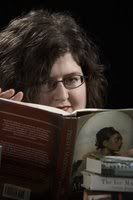 Anna recently suffered a horrendous break-up and is eager to leave Los Angeles. Unlike most exes who disappear into the woodwork, Timothy has the audacity to make it big after the split. Now his face is on the cover of People and he’s being featured on Entertainment Tonight and Anna must – leave - town - now! Luckily she’s is possession of a French passport and keys to a fabulous apartment in the Eleventh Arrondissement so running away is easy.
Anna recently suffered a horrendous break-up and is eager to leave Los Angeles. Unlike most exes who disappear into the woodwork, Timothy has the audacity to make it big after the split. Now his face is on the cover of People and he’s being featured on Entertainment Tonight and Anna must – leave - town - now! Luckily she’s is possession of a French passport and keys to a fabulous apartment in the Eleventh Arrondissement so running away is easy.It’s the arriving part that isn’t straightforward, exes have a way of stowing away and traveling with you. Determined to exorcise him from her mind, Anna decides to stay in Paris for a while and puts her bilingual skills to use and picks up work translating an erotic French novel by an anonymous author.
Vanina Marsot’s debut novel Foreign Tongue immerses readers in the sights and sounds of Paris within the first few pages. Whether she’s describing the delectable food served at a restaurant in the Marais (preserved-lemon tagine), shopping trips, or the verlan (slang) spoken by small boys playing soccer, Marsot’s familiarity with and love of the city radiates from the pages.
Yet although Foreign Tongue is, in part, an homage to the city of lights, mainly it is a novel about Anna’s discovery of herself. Unfortunately it is here that the novel fails to deliver. Much of Anna’s exploration is of a sexual nature and Marsot’s description of Anna’s translation work often carries more passion than many of the steamier scenes. However, Marsot includes some fascinating information on French slang and vocabulary usage and these lessons could be quite useful on future trips to France.
Readers should be aware that the novel Anna is translating is quite explicit and many passages are included in the text and more sensitive readers may be offended by the graphic nature of some.
ISBN10: 0061673668
ISBN13: 9780061673665
Trade Paperback
384 Pages
Publisher: Harper
Publication Date: April 14, 2009
tags: books book reviews fiction Vanina Marsot




